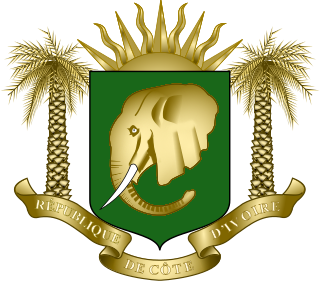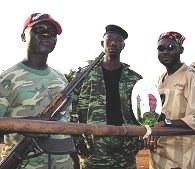
The Republican Forces of Côte d'Ivoire is the current name of the armed forces of Ivory Coast.

The Rally of the Republicans is a liberal party in Ivory Coast. The party is the country's governing party; the party's leader, Alassane Ouattara, is the current President of Ivory Coast.

The First Ivorian Civil War was a conflict in the Ivory Coast that began in 2002. Although most of the fighting ended by late 2004, the country remained split in two, with a rebel-held Muslim north and a government-held Christian south. Hostility increased and raids on foreign troops and civilians rose. As of 2006, the region was tense, and many said the UN and the French military failed to calm the civil war.

Alassane Dramane Ouattara is an Ivorian politician who has been President of Ivory Coast since 2010. An economist by profession, Ouattara worked for the International Monetary Fund (IMF) and the Central Bank of West African States, and he was the Prime Minister of Côte d'Ivoire from November 1990 to December 1993, appointed to that post by President Félix Houphouët-Boigny. Ouattara became the President of the Rally of the Republicans (RDR), an Ivorian political party, in 1999.
Ibrahim Coulibaly was a military and rebel leader in Côte d'Ivoire. A Staff Sergeant in the Armed Forces of Côte d'Ivoire, Coulibaly had served since at least the early 1990s. As Côte d'Ivoire slid into communal conflict, Coulibaly joined the 1999 coup led by Robert Guéï. A second coup, following 2000 elections that made Laurent Gbagbo President, saw Coulibaly in a leadership position, after which he came into conflict with fellow military leader Guillaume Soro. During the ensuing eight years of division in the country, Coulibaly came into conflict with both sides, eventually returning to lead an Abidjan-based militia supportive of Alassane Ouattara. Following the end of fighting, Coulibaly was killed in Abidjan by Ouattara's forces during an attempt to disarm his group. Known popularly as "IB", he was 47 years old at the time of his death.

The Dozo are traditional hunters in northern Côte d'Ivoire, southeast Mali, and Burkina Faso, and members of a co-fraternity containing initiated hunters and sons of Dozo, called a Donzo Ton. Not an ethnic group, the Dozo are drawn mostly from Mandé-speaking groups, but are also found among Dyula-speaking communities and most other ethnic groups in Côte d'Ivoire. Dozo societies increased in the last decades of the twentieth century, and Dozo groups came into political prominence during the Ivorian Civil War.

The Patriotic Movement of Côte d'Ivoire was the major rebel group in the Ivorian Civil War, which since 2005, has transformed itself into a leading political party.

Presidential elections were held in Ivory Coast in 2010. The first round was held on 31 October, and a second round, in which President Laurent Gbagbo faced opposition leader Alassane Ouattara, was held on 28 November 2010. Originally scheduled to be held in 2005, the vote was delayed several times due to the Ivorian Civil War and difficulties involved in the organization and preparation of the elections. A peace agreement between the government and the former rebel New Forces was signed on 4 March 2007, and in late April 2009, it was announced that the elections would be held by 6 December 2009, and that the date would be announced shortly. On 15 May 2009, the date was announced to be 29 November 2009. On 11 November, the elections were postponed again due to delays in the electoral roll. It was announced on 3 December 2009 to be held in late February or early March 2010.

A parliamentary election was held in Ivory Coast on 11 December 2011, after the presidential election which was held in late 2010. This followed a peace agreement between the government and the New Forces that was signed in March 2007. The Rally of the Republicans, the party of President Alassane Ouattara, won just under half the seats in the National Assembly.
Military unrest occurred in Guinea in late May 2008 as soldiers of the Military of Guinea demanded wage arrears. In the capital, Conakry, soldiers fired into the air, held the deputy chief of staff of the army prisoner, and engaged in looting. The government promised to pay the soldiers, and by the end of May the situation was reportedly calm.
The 1999 Ivorian coup d'état took place on December 24, 1999. It was the first coup d'état since the independence of Ivory Coast and led to the President Henri Konan Bédié being deposed.
Paul Yao N'Dré is an Ivorian politician and magistrate who was President of the Constitutional Council of Côte d'Ivoire from 2009 to 2011. A long-time loyalist of President Laurent Gbagbo, he had served in the government for a time as Minister of the Interior.

The 2010–11 Ivorian crisis was a political crisis in Ivory Coast which began after Laurent Gbagbo, the President of Ivory Coast since 2000, was proclaimed the winner of the Ivorian election of 2010, the first election in the country in 10 years. The opposition candidate, Alassane Ouattara, and a number of countries, organisations and leaders worldwide claimed Ouattara had won the election. After months of attempted negotiation and sporadic violence, the crisis entered a decisive stage as Ouattara's forces began a military offensive in which they quickly gained control of most of the country and besieged key targets in Abidjan, the country's largest city. International organizations have reported numerous human rights violations, and the UN undertook its own military action with the stated objective to protect itself and civilians.
Rose Doudou Guéï was wife of the Head of State of Cote d'Ivoire, Robert Guéï, and consequently First Lady of Ivory Coast from 1999 to 2000.
The following lists events that happened during 2010 in Ivory Coast.

A major mutiny broke out among the army of Ivory Coast in January 2017. The mutineers, mostly ex-Forces Nouvelles de Côte d'Ivoire rebels who had been integrated into the armed forces in 2011, were motivated by grievances about their pay and living conditions. Seizing control of nine cities throughout the country, they pressured the government to accept their demands, whereupon the mutiny ended. A second mutiny broke out among the same soldiers in May 2017.
The following lists events in the year 2017 in Ivory Coast.












